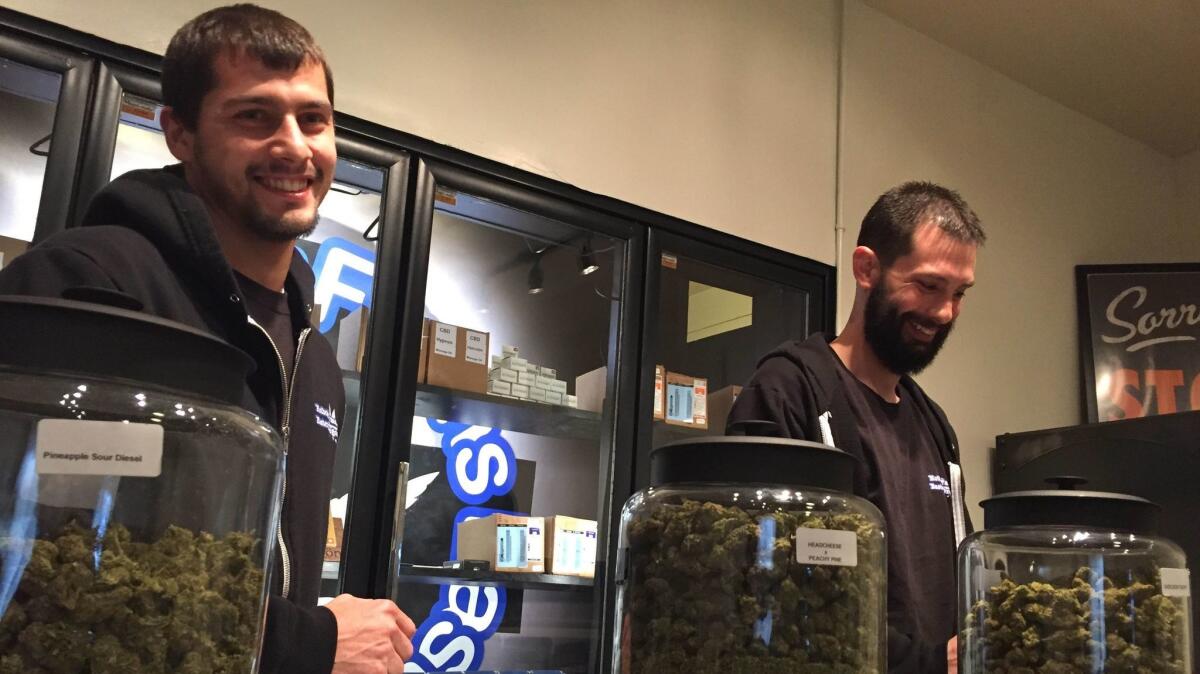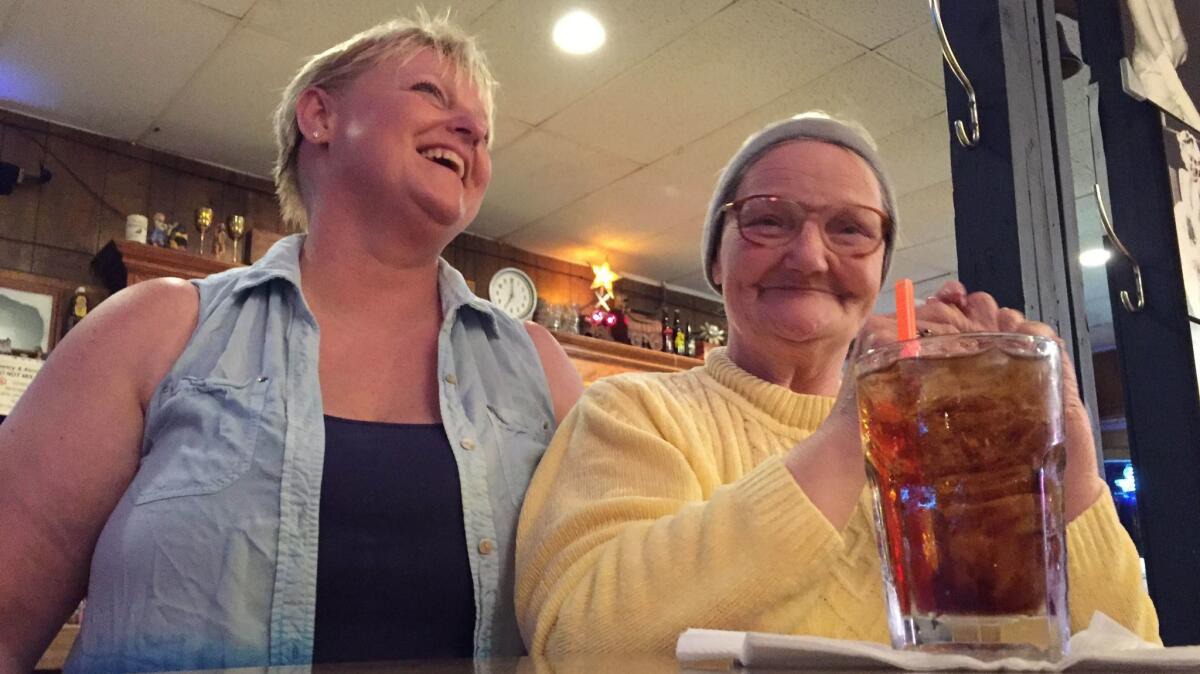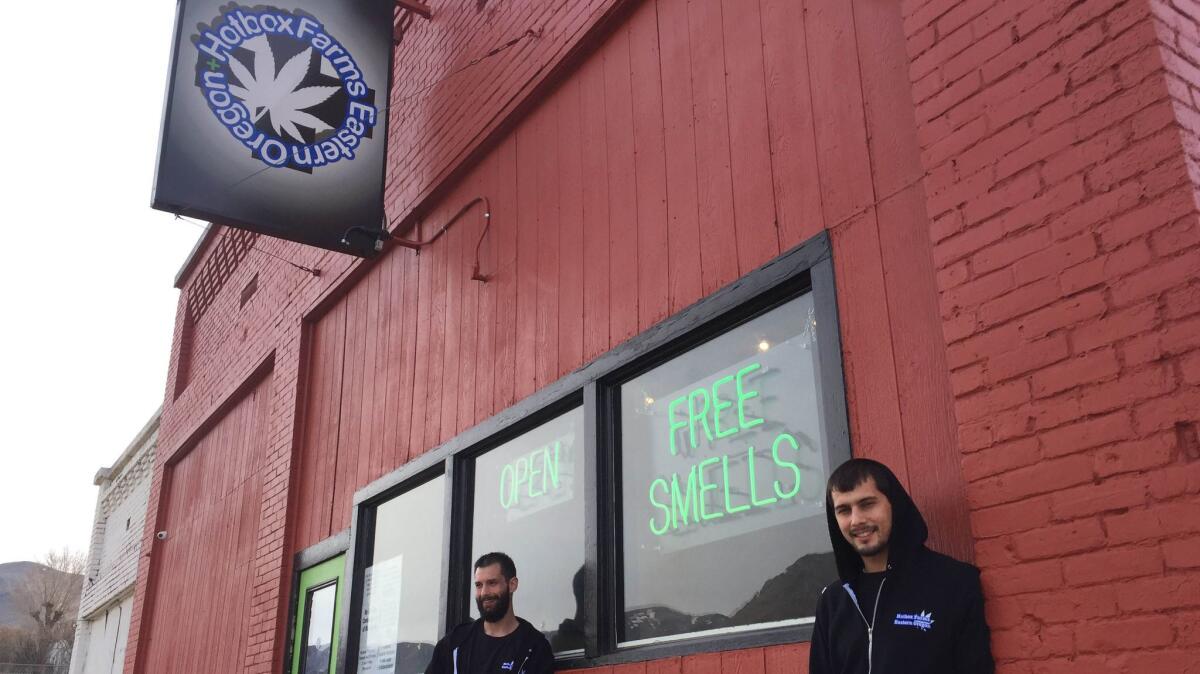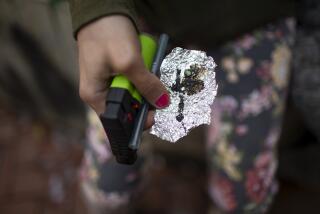Tiny Oregon town puts hope in pot shops to revive its flailing economy

The tiny town was dying.
Its crumbling roads were like dried veins leading to houses and businesses starved for life. Across the main street, locomotives rumbled past on tracks; a station once gave weary steam engines rest and the city a purpose.
For the record:
3:10 p.m. March 18, 2017An earlier version of this article said that Steven Meland, co-owner of Hotbox Farms Recreational Dispensary, was the only marijuana seller in Huntington until a shop called 420ville opened last year. 420ville opened before Hotbox Farms.
The modern diesel trains don’t stop in Huntington anymore. They haven’t for decades. With new, sleek bodies concealing muscular engines, they power past the town and into the folds of hills along the eastern Oregon and Idaho border.
Jimmy McLean sometimes watched them from the weather-beaten sidewalk in front of Howell’s Cafe — its “Open” sign optimistically blazing red through the large plate glass window. Above the restaurant, dark windows are covered by battered screens.
The cement factory that employed McLean moved away, too. It’s a concrete shell on the edge of town — abandoned, and some say haunted. People beganleaving. Huntington’s population dropped. In 2000, it was 514. In 2005, it fell to 476. Last year, it was barely over 400.
McLean, 61, took a job at Howell’s about 15 years ago — a sizable salary cut from his cement factory job. Last year, he began to think about life beyond Huntington — in the places past the hills, wherever those trains went.
And then, the marijuana shops arrived.
The cafe, with a brown Formica counter and red leather booths, began to see a few more customers trickle into its long dining area. Cars parked across the street near the rusting yellow caboose and the white gazebo, bearing license plates from Idaho, Utah, Wyoming and both Dakotas. The pancakes are popular — each one thicker than the plate it’s dished upon. He gets a lot more to-go orders as well.
“It’s not landslide business,” McLean said. “But it helps.”
When the state legalized recreational marijuana sales in 2014, cities and counties were allowed to adopt ordinances prohibiting its sale. On Oregon’s eastern side — a more conservative stretch — most of the cities and counties voted to bar pot. About 90 cities and counties throughout the state went that route.
But enough people in Huntington saw pot as a chance at economic rebirth.
The City Council voted 4 to 3 to legalize marijuana sales in 2015. Travis Young, who cast the tie-breaking vote, says the town he has called home for more than a decade desperately needed an economic boost.
“The town was drying up,” Young said. “I wanted to keep it from blowing away.”
Within months of the vote, Steven Meland arrived, bought Candy Howland’s old convenience store and opened up Hotbox Farms Recreational Dispensary. He refurbished the front room waiting area, put a green neon sign in the window advertising “Free smells” and set up a modern display area where people can choose from 52 strains of marijuana flowers stored in large glass containers.
Meland, 26, said he wanted to help Huntington get its economy going again, and employed local workers at $15 an hour. Already, another marijuana retailer — 420ville — had been occupying what used to be a car service station at the other end of the main road.
Meland doesn’t mind the competition. To him, that’s just capitalism.
I don’t smoke it and I don’t like it. It just leads to other problems.
— A local man known as Catfish Bob
On a recent Saturday, both places had lines of people waiting. At 420ville, Allan Driver checked people in and gave them numbered white tags.
Nick Brown, who had driven from Boise, Idaho, with Keshawn Carter, saw the line and decided to visit High Mountain Smoke Shop, which sells marijuana paraphernalia and other general items but isn’t licensed to sell pot. The shop looks like it was once a house but now bears commercial signs and banners outside its blue exterior.
Brown, 21, bought a bong and spent about an hour inside the shop browsing and chatting with the steady stream of customers also passing the time.
When he left for 420ville, he got a number and waited outside with Carter as an electronic female voice announced over the loudspeakers, “53 please.”
“It’s like a deli or something,” Brown said.
The wait was about 30 minutes, and when he went back to 420ville’s display area behind a closed door that could be opened only by staff, he bought some Skywalker OG and Blue Cheese for a total of $86.40. The Skywalker was $14.40 a gram — a good price, Brown said.
He said he’d been smoking marijuana since he was 16 and recalled the first time he tried it.
“I smoked it and then went upstairs to play a video game — ‘Assassin’s Creed,’” Brown said. “The thing was, I was afraid of heights, andso while I was playing the game, I wouldn’t let my character in the game climb anything.”
Carter nearly doubled over laughing. “I never knew that story,” he said.
His father smoked pot, but Carter said Brown has studied marijuana extensively and is known by his dad and friends as Dr. Pot.
Brown said that he found the dispensaries on the Weedmaps phone app and that the hour drive was worth it because the product was reputable and was easier to get than trying to score it illegally in Boise.
Idaho State Police spokesman Tim Marsano said that the agency hadnoticed an uptick in marijuana being sold illegally in the state, but that officers weren’t targeting people crossing the state line from Oregon because they suspect they may have pot in the car.
“We do not profile,” he said. “We haven’t changed our tactics.”

When Huntington passed its marijuana ordinance, it limited sales to the two shops. The city will pick up a 3% tax on the sales; officials hope the revenue will add up quickly as people like Brown and Carter make regular trips to Huntington. The next closest legal recreational dispensary is in Sumpter, a 90-minute drive from Huntington.
Howland, now the town’s mayor, was at the local bar having a Friday evening drink with Cindy Deck, who also sits on the City Council. Howland said she hoped the revenue would help repair the city streets. The 62-year-old said she’d also like to have a full-time EMT and ambulance, something not possible in the city’s current annual budget of $372,000.
But she also vehemently opposed Huntington getting into marijuana sales. Howland said she tried pot when she was 26, smoked it regularly until she was 45 and then quit after finding she needed to use it all day just to function. She is also worried the only real beneficiaries of the ordinance are the two dispensaries.
“They’re doing great,” she said. “But I don’t see them helping the city.”
The revenue stream from marijuana isn’t known yet as the state won’t begin dispersing the tax revenue until later in the year. Last year, the state picked up more than $60 million in tax revenue.
Mark Pettinger, spokesman for recreational marijuana at the Oregon Liquor Control Commission, said there may be some changes to the distribution of the money after July 1, but currently 10% of the state tax revenue is to be distributed to cities and 10% to counties.
Pettinger said one of the changes might be to increase the slice of the tax pie given to cities and counties and to give larger allotments to those that have licensed retailers.
But the expected revenue jump wasn’t enough to keep Jack Helm around. And his leaving caused quite a stir in Huntington.
The owner of the only gas pump in town, Helm ran the Country Store for four years but decided to retire and leave town. He figured he’d do some traveling — maybe a vacation in Las Vegas to start, he said.
He sold the store property to Meland, co-owner of Hotbox Farms, who said he planned to build a greenhouse to grow marijuana.
Opponents of marijuana have circulated a rumor that once Meland takes possession of the property April 3, the town will have no groceries and no gas. The next-closest place for both is in Ontario — a 30-mile drive south that includes five miles along Highway 30, where part of the road past Farewell Bend is gravel.
But supporters — and Helm, Meland and Young — say the store will be closed only for a short period while it’s renovated and will reopen selling groceries and fuel before the town’s signature event: the Catfish Derby.

Meland says the store will be “family friendly” and the weed crop will be hidden from view by blacked-out fences. He says the store hopes to be involved in the derby and already has donated items to the city.
“We want to be a part of the community,” he said. “We want a diverse economy that benefits everyone.”
Helm, wearing a Hotbox Farms T-shirt, walked through the aisles of the store on a recent Saturday evening; most everything was marked half-off or two-for-one. He sorted a few bottles of soda in the fridge. He said Sundays used to be his busiest days, but now it’s the slowest day because marijuana sales aren’t allowed.
A local — known simply as Catfish Bob — walked in with mud-caked jeans and wandered over to the batteries. He’d been fishing down at the reservoir along the Snake River, as he did most days.
“Are they half-off?” he asked.
The store clerk was about to say they weren’t, but Helm waved her off. He needed to get rid of the goods and he wasn’t about to tangle with a Catfish Derby winner who also once caught a 7-foot sturgeon (he swore).
“Yes,” he said to Catfish Bob.
The old man brought them to the counter. After lamenting his lack of luck fishing, the talk shifted from fishing woes to weed worries. Helm listened mostly.
“I don’t smoke it and I don’t like it,” Catfish Bob said. “It just leads to other problems.”
He stuffed the batteries in his pocket and flashed an almost toothless smile. “But what do I know?”
Bob left the store and shuffled across the parking lot. The pot shops were closed and the roads were empty. The train tracks were silent while he passed the fuel pump with a handwritten sign on a whiteboard.
In black and red letters it read: “Fill ’er up. We’re here for you!!! Thank you!!!”
Twitter: @davemontero
ALSO
What is the future of recreational marijuana in Trump’s America?
Pot festival in Nevada goes forward despite fears of federal crackdown
Trump administration signals a possible crackdown on states over marijuana
More to Read
Start your day right
Sign up for Essential California for news, features and recommendations from the L.A. Times and beyond in your inbox six days a week.
You may occasionally receive promotional content from the Los Angeles Times.







